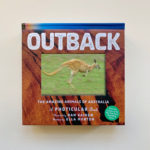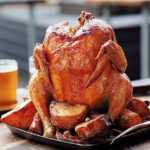 I generally think of myself as a fairly responsible eater – avoiding fast food, shopping the perimeters of the supermarket, buying “wild caught” fish, and perusing the local farmer’s market. But do I really know the provenance of my food? Well, sort of. So I’d like to step it up a notch and start reading food labels with greater care—except all the terminology can be confusing, what am I actually looking for? When I saw that Steven Raichlen’s Planet Barbecue! very concisely listed some of the principles he and his family try to apply to their shopping and cooking, it seemed like a great go-to checklist to keep on hand…
I generally think of myself as a fairly responsible eater – avoiding fast food, shopping the perimeters of the supermarket, buying “wild caught” fish, and perusing the local farmer’s market. But do I really know the provenance of my food? Well, sort of. So I’d like to step it up a notch and start reading food labels with greater care—except all the terminology can be confusing, what am I actually looking for? When I saw that Steven Raichlen’s Planet Barbecue! very concisely listed some of the principles he and his family try to apply to their shopping and cooking, it seemed like a great go-to checklist to keep on hand…
Shop local: Food grown in your region supports local farmers and requires less fossil fuel to transport.
Shop seasonal: Food tastes best and costs less when you buy in your area’s peak season.
Shop farmers’ markets: Farmers’ markets are a great place to buy fresh, local, seasonal food, and you are also supporting your local growers and farmers.
Buy free-range: Animals that feed, graze, and move around in open air are healthier than chickens crammed into factory coops or steers crowded into feedlots.
Buy organic: Eating meat from animals fed hormones to accelerate their growth and antibiotics to keep them alive in crowded conditions may not sit well with shoppers. The USDA Organic label means your food is drug- and synthetic chemical-free.
Check the temperature: Cook all chicken and turkey to at least 170°F. Cook all burgers and sausages to at least 160°F. Use an instant-read meat thermometer to check for doneness.
Buy Fair Trade: The World Fair Trade Organization makes sure that growers and food producers in developing countries are paid a fair living wage for their labors. Look for words “Fair Trade” when you buy coffee, sugar, chocolate, bananas and other staples.
Buy wild: While it’s not always available, and it costs more, wild fish has a superior texture and flavor to farmed.
Buy underutilized species: Overfishing has depleted many of the world’s fish species, among them cod and sea bass. Other species are plentiful, cheap and perfect for grilling, including kingfish, bluefish, mackerel, and sardines. The list of endangered species changes from region to region and can be checked on www.montereybayaquarium.org.
Grill Green: If you’re a charcoal griller, use natural lump charcoal, made from pure wood, and light it in a chimney starter. This cuts down on petroleum residue and fumes.





No Comments